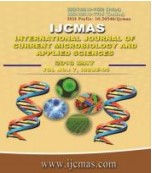


 National Academy of Agricultural Sciences (NAAS)
National Academy of Agricultural Sciences (NAAS)

|
PRINT ISSN : 2319-7692
Online ISSN : 2319-7706 Issues : 12 per year Publisher : Excellent Publishers Email : editorijcmas@gmail.com / submit@ijcmas.com Editor-in-chief: Dr.M.Prakash Index Copernicus ICV 2018: 95.39 NAAS RATING 2020: 5.38 |
Science and technology have had unprecedented impact on economic growth and social development. Knowledge has become a source of economic light and power. This has led to increased restrictions on sharing of knowledge, to new norms of intellectual property rights, and to global trade and technology control regimes. Scientific and Technological developments today also have deep ethical, legal and social implications. The study was conducted in Haryana State. Four districts, two each form eastern and western agro climatic zones were selected randomly. Eight villages from these districts were selected randomly to draw a representative sample of 250 rural women as respondents of the study. Landholding had an association with scientific temper. Type of health care service used during illness is influenced by size of land holding. Probably the income is largely dependent on land holding. With increase in land holding size majority of respondents use city hospital facility. Adoption does depict an increasing positive land with increase in land holding respectively. Size of land holding determines standard of living in rural areas and drainage for water disposal. With increase in land holding size pucca drainage system was adopted by most of the families. Soakage pit technology, a recommended technology found in small per cent of rural families from medium and large land holding. The respondents with semi-medium, medium and large landholdings had medium level of scientific temper whereas the respondents under marginal and landless category had low level of scientific temper i.e. low level of knowledge and understanding regarding science. With increase in land holding size adoption of sanitary napkin by rural women increases.
 |
 |
 |
 |
 |